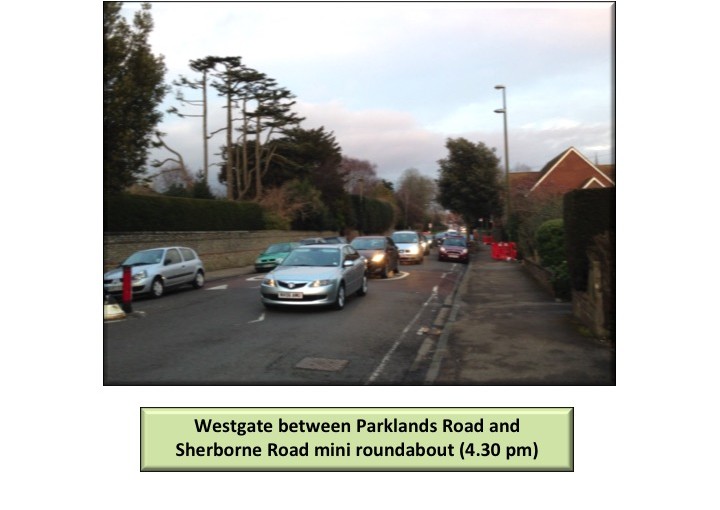This post was the second in a weekly series of five “what-if?” suggestions proposed in parallel over the festive season 2015-16, that seek to provoke your thoughts about solutions to the traffic impacts of the development on Westgate, but which may also never see the day.
Let alone consideration of the further problems that will occur with additional traffic from the WHF development, Westgate already has traffic problems.
Solution 1
The closure of Westgate somewhere between Parklands Road and Sherborne Road, best located at the Parklands Road end, would immediately stop the current rat-running. This may be an inconvenience to some local residents in Westgate and Sherborne Road but in general they will most likely be using their cars to travel westwards to the A27 rather than eastwards along Westgate to the Westgate Roundabout and Orchard Street. Even then these people can still use Via Ravenna and Avenue de Chartre to get to the city centre. In any case more sustainable methods of travel are available for such short journeys. Closure of Westgate will also significantly improve safety for cyclists in Westgate. All in all a great idea.
The developer’s argument is that the construction of an improved junction at the A27 Fishborne Roundabout as shown in the local plan, will significantly reduce queuing back in Cathedral Way and Via Ravenna. This will make these major distributor roads more attractive and will take much of the present and future rat-running traffic away from Westgate. Iy is hard to agree with this scenario, especially as the A27 improvements are only being designed to mitigate (cater for) the additional traffic generated by the four major strategic developments in the local plan, including WHF: they will not cater for traffic growth on the A27 by 2029, so major delays will still occur then.
This is a complicated scenario that would need much more detailed investigation to fully understand the traffic implications.
There is the immediate possibility of making Sherborne Road more attractive for rat-running traffic if Westgate is closed between Sherborne Road and Parklands Road. Clearly the main beneficiaries would be residents in Westgate and those that use sustainable means of transport that are allowed through Westgate (pedestrian/cyclists/buses).
Finally, as far as the impact of WHF traffic (Phase 1) is concerned, the introduction of a closure in Westgate will radically change the routes chosen by traffic from this development. There is only a northern access proposed under this Phase and there will still be a resulting significant increase in traffic along Sherborne Road and along St Paul’s Road to Northgate (as predicted by the developer). These remain the only two routes east and south of the development.
Solution 2
It is only by the introduction of a second southern access by Bishop Luffa playing fields under Phase 2 that traffic in Sherborne Road will be reduced. Under Phase 2 if Westgate is also closed then this traffic will be forced to use Via Ravenna and Cathedral Way.
Assuming that traffic calming in Sherborne Road is made effective and Westgate is closed to vehicular traffic, then a significant proportion of traffic that currently travels down Sherborne Road and turns left into Westgate will no longer be able to take this route. Motorists will be faced with the options of not using Sherborne Road or of crossing the mini roundabout to access Via Ravenna or Cathedral Way. This would be likely to reduce the traffic on Sherborne Road.
Unfortunately this will probably increase traffic on St Paul’s Road towards Northgate. Some of these drivers may even then decide to use Parklands Road to access Westgate and the city centre east of the Westgate closure. To deter this increase in traffic along Parklands Road would then require further more significant effective traffic calming in Parklands Road; something that is not currently proposed by the developer.
